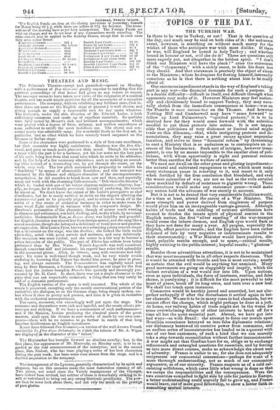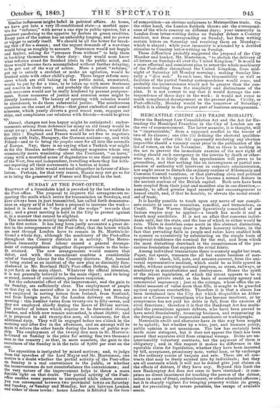'TOM OF THE DAY.
• THE TURKISH WAR.
Is there to be war in Turkey, or not ? That is the question of the day, and much may be said on both sides of it : the unknown event, however, is marching on without much mercy for the wishes of those who anticipate war with most dislike. If there be war, will England be bound to help Turkey ; and whether bound in honour or not, mill she do it? Those are questions still more eagerly put, not altogether in the boldest spirit. " I don't think our Ministers will have the pluck ! " cries the statesman of the " shopocracy," with a sickly sneer, to hide his fears lest they should. And that statesman is precisely the object of alarm to the Ministers ; whom he despises for fearing himself, internally conscious as he is that there is nothing about him to be really afraid of.
One enormous impediment stands in the way of England's taking part in any war—the financial demands for such a purpose. It is a double difficulty—difficult in itself, and difficult through what opponents may make of it. However Ministers may feel nation. ally and chivalrously bound to support Turkey, they may natu- rally shrink from the immediate consequence at home—war on the Danube is more income-tax on the Thames. And however Notting Hill and Camberwell may have "come forward" to follow up Lord Palmerston's "spirited protests," it is to be doubted how far they would come forward with the subsidies needful to put those protests into action. It is not impos- sible that politicians of very dishonest or limited mind might trade on this dilemma,—that, while instigating protests and de- nunciations, they may raise a great outcry against unpopular taxation, and strive to force "financial reform by threatening to oust a Ministry that is so audacious as to contemplate an in- crease of the Income-tax. Such sort of intrigue however trans- parent, is one by no means impossible to the smaller class of poli- ticians, with whom opportunity is right and personal success better than sacrifice for the welfare of nations.
We need not dwell on the other great and glaring impediment— the natural and cultivated repugnance to war, which must make every statesman pause in resorting to it, and resort to it only when fortified by the firm conclusion that bloodshed, and even the worse calamities of war, are not so bad as the evils entailed upon mankind by default of resistance to gigantic wrong. These considerations would make any statesman pause—would make any nation hold the advocate of war sternly to account.
But it is not to be denied that very considerable facilities would, for a time at least, attend the career of a War Minister. The mere strength and power derived from singleness of purpose would place him on an inexpugnable vantage-ground. _ Although habits of trade and the coddling of extreme civilization have seemed to deaden the innate spirit of-physical contest in the English nation, the first "silver snarling" of the war-trumpet would rouse the inborn deemon, and English eyes would flash as they have not done for many a year. All peoples, especially the English, affect positive results ; and the English have been rather sickened of late by very negative or indeterminate results to their statesmanship : a War Minister would have positive, dis- tinct, palpable results enough, and to spare,—critical results, highly exciting to the public interest ; hopeful results ; " glorious " results.
Besides those adventitious attractions, it is not to be maintained that war must necessarily be in all other respects disastrous. That it would be attended with trouble and loss is most certain ; nearly as certain that the evil would be anything but unmixed. Many good movements are going on sluggishly and ineptly, which the violent revulsion of a war would stir into life. Upon nations, even as upon individuals, the force of inertness, routine, and false shame, is paralyzing ; it is difficult for the most powerful to take heart of grace, break off its long error, and turn over a new leaf. We shall but touch upon instances.
Commerce would be harshly jarred and unsettled, but not alto- gether unhappily if after the disturbance it settled again in bet- ter channels. We see it to be in many cases in bad channels, but we cannot effect the change, which might perhaps be done at a jerk. At home, our railway habits of trade might not be the worse for some overwhelming deluge of other interests to break off for a time all but the quiet essential part. Abroad, we have got into bad ways—as with Brazil : the attempt to force our morals upon Brazilian conscience betrayed us into false diplomatic relations; our diplomacy borrowed its coercive power from commerce, and an endless series of inconsistencies has landed us in a quarrel with one of our best customers, of such a kind that we can scarcely take a step towards reconciliation without further inconsistencies. A war might cut that Gordian knot for us, oblige nate exchange refinements and entangled questions for essentials, and by forcing us into more direct courses, make us acknowledge the sweet uses of adversity. France is unfair to us; for she does not adequately reciprocate our commercial concessions—perhaps for want of a more thorough understanding, not so much of our economical arguments as of our sincerity. Prance suspects us of a cold cal- culating selfishness, which cares little what wrong is done so that we escape the responsibilities and the consequences. Were the two countries convened to fight side by side for justice to Europe, a better understanding could scarcely fail to grow up, and EranCa Would learn, out of mere good fellowship, to show a better faith in consulting mutual interests. Similar infitiences'mikht befall in political affairs. At home, we have got into a very ill-conditioned state—a morbid appe- tite for "reforms," with never a one ripe in public opinion, but a constant pandering to the appetite by dealers in green crudities. Every part of the nation has an unhealthy longing, and no power or eigspr to satisfy itself. We should be all the better for break- ing this off for a season; and the urgent demands of a war-time would bring us roughly to account. Statesmen would not boggle and faulter, asking for "pressure from without" to help them in buckling themselves to their duty: they would soon know what reforms stand for finished ideas in the public mind, and those would become facts accomplished without further delaying, to be got out of the way of action. Mere a priori "reforms," got up to satisfy a crotchet or make an agitation, would be brushed aside with other child's-play. Those larger reform mea- sures which are still baking in the public mind, unmatured, would be put by for a time, to be taken up with more freshness and resolve in their turn; • and probably the ultimate success of such measures would not be really hindered by present postpone- ment. Some measures of justice and common sense might be directly hastened. The luxury of sporting with colonies would be abandoned, to do them substantial justice. The mischievous squadron on the coast of Africa—that great embodied and armed nonsense, which yearly diverts a good round sum, engages our ships, and complicates our relations with friends—would be given up.
Abroad, changes not less happy might be anticipated : embar- rassments arising from deference for many an old treaty would be swept away ; Austria and Russia, and all their allies, would for- feit 1815 : England and France would be set free to negotiate directly with Italy, Hungary, the German nations—ay, and with Poland—and so to bring the peoples once for all into the councils of Europe. Nay, there is no saying what a Turkish war might do for the Russian nobles—those unhappy magnates whom one occasionally meets wandering about the Continent, "on leave," stung with a mortified sense of degradation to see their compeers of the West, free and independent, travelling where they list with- out reporting all their movements to a bureau at home. No—a war in 1850 would not tend altogether in favour of Abso- lutism. Perhaps, for that very reason, Russia may not go so far as to bring the generosity of France and England to the test.

























 Previous page
Previous page